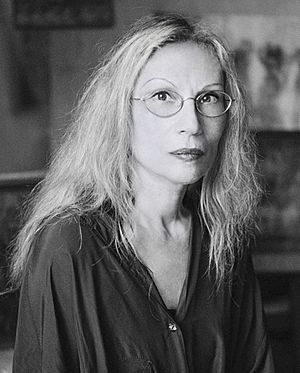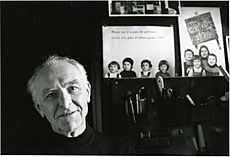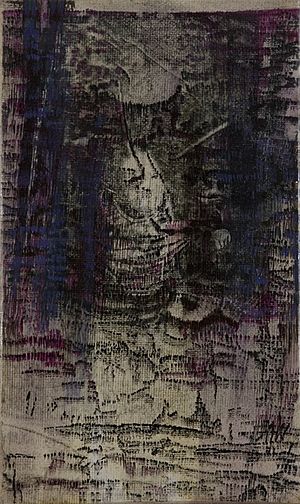Bracha L. Ettinger facts for kids
Quick facts for kids
Bracha L. Ettinger
|
|
|---|---|
 |
|
| Born |
Bracha Lichtenberg Ettinger
23 March 1948 |
| Alma mater | Hebrew University of Jerusalem |
| Era | Contemporary philosophy |
| Region | Western philosophy |
| School | Continental philosophy Psychoanalysis |
|
Main interests
|
Lacanian psychoanalysis, art, feminist theory, aesthetics, human rights, ethics |
|
Notable ideas
|
Matrixial gaze, matrixial space, transjectivity, transubjectivity, copoiesis, wit(h)nessing, carriance, fascinance, ...-into-life, being-toward-birthing, coemergence, matrixial trans-subjectivity, the Subreal |
Bracha Lichtenberg Ettinger (Hebrew: ברכה ליכטנברג אטינגר; born 23 March 1948) is a famous Israeli-French artist, writer, and thinker who lives in France. She was born in what is now Israel. She is known for her ideas about art and how we understand ourselves and others.
Ettinger created important ideas like the "matrixial space" and "matrixial gaze." These ideas help us think about feelings, art, and how people connect. She teaches at the European Graduate School in Switzerland and GCAS in Dublin. In 2023, she was part of a group choosing the artistic director for a big art show called Documenta. She left this role to encourage important discussions in the art world.
Contents
Life and her Journey
Bracha Lichtenberg was born in Tel Aviv on March 23, 1948. Her parents were Jewish-Polish survivors of the Holocaust. She studied psychology at the Hebrew University of Jerusalem. She also worked with famous thinkers like Amos Tversky and Danny Kahneman.
From 1975 to 1979, she lived in London, where she continued her studies and training. She became a British citizen during this time. Her daughter, Lana Ettinger, who is now an actress, was born in London.
In 1981, Bracha moved to Paris to become a professional artist. She had been painting and drawing since she was a child. Her son, Itai Toker, was born in 1988. Since 2003, she has worked in both Paris and Tel Aviv. She also studied psychoanalysis and art theory, earning her Ph.D. in Art Aesthetics in 1996.
Art Exhibitions and Influence
Ettinger's art has been shown in many important places. She had a special project at the Pompidou Centre in Paris in 1987. She also had solo shows at the Israel Museum in Jerusalem in 1995 and the Centre for Fine Arts in Brussels in 2000. More recently, her work was shown at the Pompidou Centre in 2024 and Castello di Rivoli in 2022.
Her art and ideas have inspired many other artists and thinkers. These include art historian Griselda Pollock and philosophers like Jean-François Lyotard. Ettinger also started writing her unique poetic art notebooks in 1981. These notebooks became a source for her theories.
She taught at the University of Leeds and the Bezalel Academy of Art and Design in Jerusalem. In 2006, she became a professor at the European Graduate School. She created the "matrixial theory" in psychoanalysis, which is a new way of understanding how people connect and grow.
Her Art and Ideas
Bracha Ettinger's art explores deep topics like trauma and the experiences of women during wars. She also looks at female figures from mythology, such as Eurydice and Medusa. Her abstract paintings explore light and space, similar to artists like Monet.
Her work often deals with the human condition and the sadness of war. In this way, she connects with artists like Käthe Kollwitz and Francisco Goya. Her painting process moves between clear figures and abstract shapes. She also creates notebooks that are artworks themselves.
From 1981 to 1992, she mainly created drawings and mixed media pieces on paper. Since 1992, she has focused on mixed media and oil paintings. Some of her ongoing series include "Matrix — Family Album" and "Eurydice." These works explore how memories and traumas are passed down through generations. They also look at the journey from pain to beauty.
Ettinger is seen as a major artist in "New European Painting" and an important feminist thinker. Besides painting, she has created installations, video art, and "encounter events." Her art has been shown in major museums around the world. In recent years, her oil paintings often feature figures like Medusa and Demeter. She also creates new digital video films that have many layers, like her paintings.
Selected Solo Art Shows
- Bracha L. Ettinger: Eurydice - Kaddish – Medusa, Pompidou Centre, Paris (2024)
- Bracha L. Ettinger. Andrew Kreps Gallery NY (2022)
- Bracha L. Ettinger: BRACHA's Notebooks. Castello di Rivoli Museum, Torino (2021-2023)
- Solo show at Kochi Biennale, India (2018)
- UB Anderson Gallery, Buffalo, USA (2018)
- Silesian Museum, Katowice, Poland (2017)
- Freud Museum, London (2009)
- The Drawing Center, New York (2001)
- Centre for Fine Arts, Brussels (2000)
- Israel Museum, Jerusalem (1995)
- The Museum of Modern Art (MOMA), Oxford (1993)
- The Russian Ethnography Museum, St. Petersburg, Russia (1993)
- The Pompidou Centre, Paris (1987)
Selected Group Art Shows
- Castello di Rivoli, Turin (Artists in a Time of War 2023)
- Kochi-Muziris Biennale (2018-2019)
- Bonnier Konsthall, Stockholm (The Image of War, 2017)
- Gladstone Gallery, NY (Lyric on a Battlefield, 2017)
- 14th Istanbul Biennial (Saltwater, 2015)
- Museum of Modern Art, Warsaw (In the Heart of the Country, 2013–2014)
- The Pompidou Centre Paris (ELLES@centrepompidou, 2010–2011)
- Kiasma Museum of Contemporary Art, Helsinki (ARS 06 Biennale, 2006)
- Stedelijk Museum, Amsterdam (Kabinet, 1997)
- The Pompidou Centre (Face à l'Histoire, 1996)
- Institute of Contemporary Art (ICA) Boston (Inside the Visible, 1996)
- Whitechapel Gallery, London (Inside the Visible, 1996)
- Israel Museum, Jerusalem (Routes of Wandering, 1992)
Her Ideas on the Mind
Ettinger is a thinker who created a special way to talk about the "feminine-maternal" side of art and how we care for others. She came up with the idea of "matrixial space" and "matrixial gaze" in her art notebooks starting in 1985. She then published these ideas in academic papers from 1992.
Her "matrixial theory" suggests that we are all connected to others in a deep, unconscious way. This connection comes from our earliest experiences, even before birth. She believes this connection helps us develop our sense of self and our ability to care for others. This theory has changed how people think about women, human connections, and art.
Ettinger believes that when we understand this "matrixial" connection, it helps us think about our responsibility to each other and the world. She is a senior clinical psychologist and a psychoanalyst. Her ideas have influenced discussions in art, psychology, and women's studies.
Key Ideas in Her Theory
Ettinger's "matrixial trans-subjectivity theory" includes many new concepts. These include:
- Matrixial gaze: A special way of seeing and connecting with others.
- Borderlinking: How we connect with others while still being ourselves.
- Borderspacing: How we create space for ourselves while still being connected.
- Copoiesis: Creating together.
- Wit(h)nessing: Being a witness to something with another person.
- Carriance: A deep, unconscious caring and carrying of another.
She calls the changes in this "matrixial" area "metramorphoses." These ideas help us understand how memories and experiences are passed down through generations. They also help us understand trauma and how art is created.
Ettinger believes that a deep sense of compassion and wonder comes from these early connections. This compassion is a basic ethical feeling that helps us connect with others. She suggests that therapists should be aware of this "matrixial transference" in their work. This means understanding the deep, shared connections between people.
Her later work focuses on the spiritual side of art and ethics. She also explores how compassion and empathy work. She believes that "empathy within compassion" helps people heal and grow creatively. This means truly understanding someone's feelings while also having compassion for everyone involved.
Other Activities

When she was 19, Ettinger led a huge rescue operation. She helped save young men from the Eilat shipwreck in 1967. She was injured during this event. Years later, she received the highest Air-Force Medal for Heroism for her actions.
Ettinger supports human rights and believes in peace between Israel and Palestine. She has been a feminist activist for peace for decades. She works with groups like "Women Make Peace" and "Physicians for Human Rights." As a clinical psychologist, she helps Palestinian patients in need.
She is also known for her portrait photography. She takes photos of people during conversations. Some of her famous portraits include those of Robert Doisneau and Emmanuel Lévinas.
Fascinance: Forum for Ettinger Studies
Fascinance is a group started by Srishti Madurai in South India in 2013. It offers courses on Ettinger's ideas about psychoanalysis.
The goals of Fascinance are:
- To read and discuss Bracha L. Ettinger's works.
- To use her "matrixial theory" in art, philosophy, and psychology.
- To explore how her ideas connect with biology and other sciences.
- To understand how her approach differs from other ideas in psychology.
See also
 In Spanish: Bracha Ettinger para niños
In Spanish: Bracha Ettinger para niños
- New European Painting
- Feminist Psychoanalysis
- French Feminism
- The Sublime (Jean-François Lyotard)
- 20th century Women Artists
- Écriture féminine
- Gender studies
- Feminist film theory


